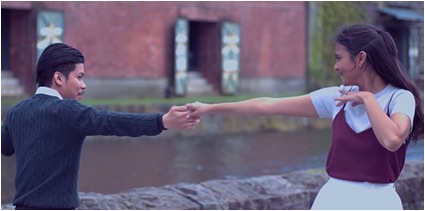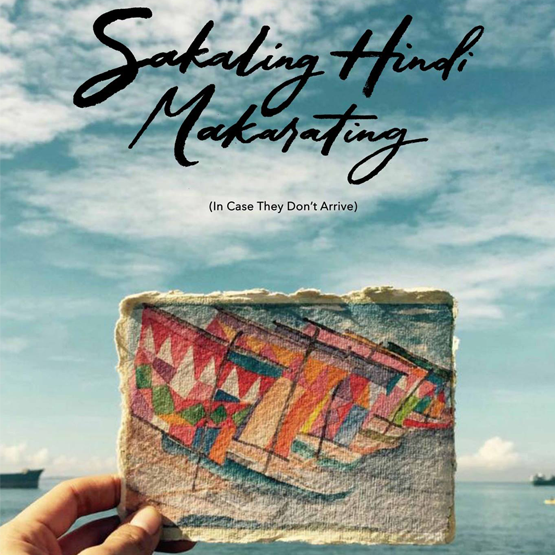Arts & Culture
The Uncommon Traditions that Mexicans and Filipinos share when celebrating the Day of the Dead.
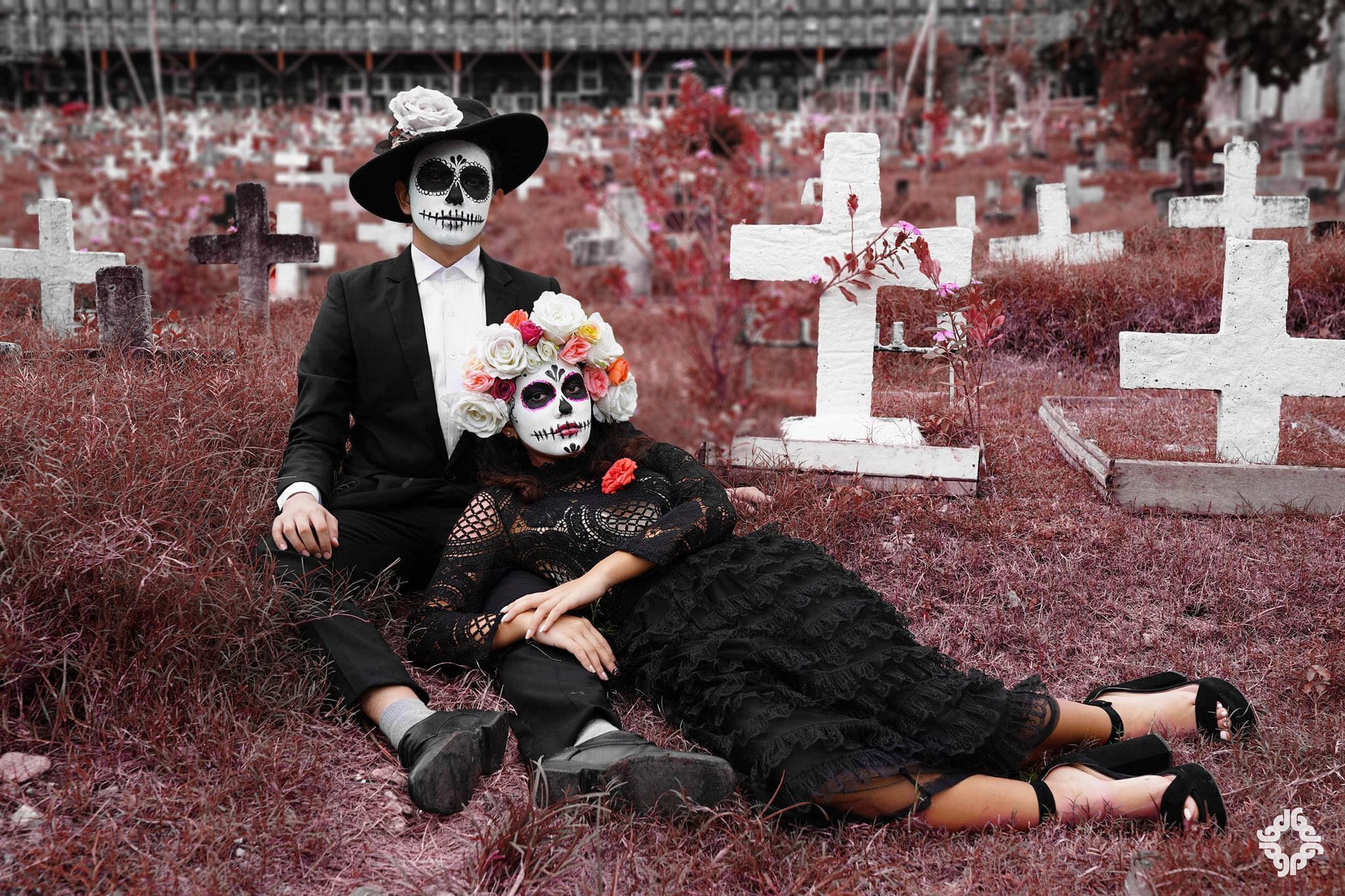
Dia de los Muertos
By Allain Dumon Fonte
The 2nd of November is All Soul’s Day, a holiday that is very important to many Filipinos to remember our loved ones who passed on. This is also widely celebrated in Mexico as “Dia De los Muertos” or in English, “The Day of the Dead”. And Mexicans celebrate the 2nd of November grander than they celebrate Christmas. Well, you can witness it from the Disney movie, “Coco”.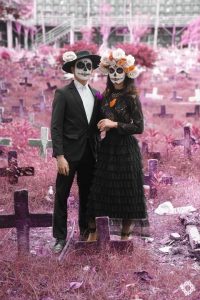
As All Soul’s Day or Dia de los Muertos is about to end, here are some interesting traditions and superstitions that Filipinos and Mexicans share:
1. IT IS NOT ON THE 31st OF OCTOBER
Dia de los Muertos or All Soul’s Day is not practiced on October 31st or on the Hallow’s Eve as many other western cultures practice; but we celebrate it on the 2nd of November. We celebrate November 1st as All Saint’s Day or the Day of the Holy, while in Mexico they call it Dia de los Innocentes or Dia de los Angelitos to commemorate the children who died too early in life.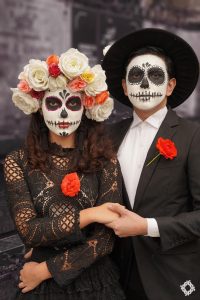
2. THE RITUAL
Both in Mexico and in the Philippines, we visit the grave of our loved ones and we clean it well. This is a ritual to honour their resting places and to let them know that they are never forgotten.
3. FLOWERS INVITE SPIRITS
In Mexico, they believe that the scent of flowers attract spirits. So the flower offerings are invitation to their dead loved ones to visit the living families. While in the Philippines, we believe that flowers offered to the dead exalt the souls and somehow fill in the sadness that we feel when missing our dead loved ones.
Most of the time, Filipinos choose all-white flowers to offer because white is the absence of colour, which means the absence of Joy and happiness. White also symbolises purity of soul which we hope our dead loved ones will attain as they journey to heaven. While in Mexico, they have the yellow Mexican marigolds as the official flowers of the dead that will guide them in their journey to the afterlife.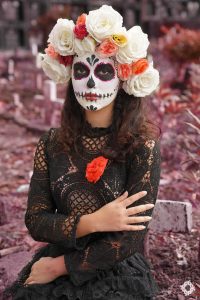
4. THE LEGEND OF THE MONARCH BUTTERFLIES
Both cultures believe that monarch butterflies are dead loved ones who visit us and show their appreciation that we have not forgotten them. A presence of monarch butterflies also means that our dead loved ones are always there guiding us and looking after us.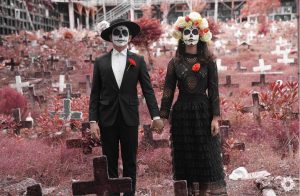
5. A PICNIC IN THE GRAVEYARD
Spending a night at the graveyard and picnicking with the rest of the family may sound very creepy to many; but to both Filipino and Mexican cultures, picnicking and spending a night at the cemetery is a must to show our love to our dearly departed. It is the only time in the year that families gather and tell stories of the dead loved ones and how colourful or how great their lives were.
6. FOOD FOR THE DEAD
In Mexico, they have what they call “ofrendas” or an altar where the pictures of their dead loved ones are displayed and offered with flowers, candles, and their favourite food. Very similar to the Filipino culture of cooking the favourite food of our dead loved ones and everyone in the family enjoys the food for dinner.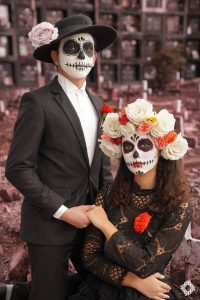
My family tradition involves me driving all the way to Colon street and buy that famous Snow Sheen’s “pancit canton”. This is my granddad’s favourite snack. Sadly, the old Visayan Restaurant is no longer there. My late uncle and my late grandpa love their sweet ad and sour fish. We also set up an “ofrenda” on their graveyard and eat their favourite food while picnicking in the cemetery. We do not spend a night in the cemetery; but while we are picnicking there, we usually play the songs of Pilita Corrales and Susan Fuentes that my late grandpa used to listen every afternoon while enjoying his coffee, pan de sal, and pancit canton.
What about your family traditions? Share your thoughts by commenting to this article.
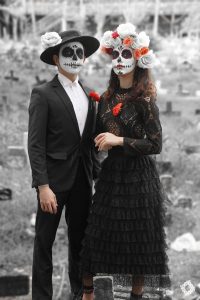 MODEL: Michael Joseph Mortola Enriquez & Alexis Wingfield
MODEL: Michael Joseph Mortola Enriquez & Alexis Wingfield
PHOTOGRAPHER: Gianne Paolo Anciano
HMUA/DESIGNER: Hazel Ocaba
STYLING: GPA Lifestyle + Clothing
Arts & Culture
Art Beat: Scenes From the Manila Art Fair 2026
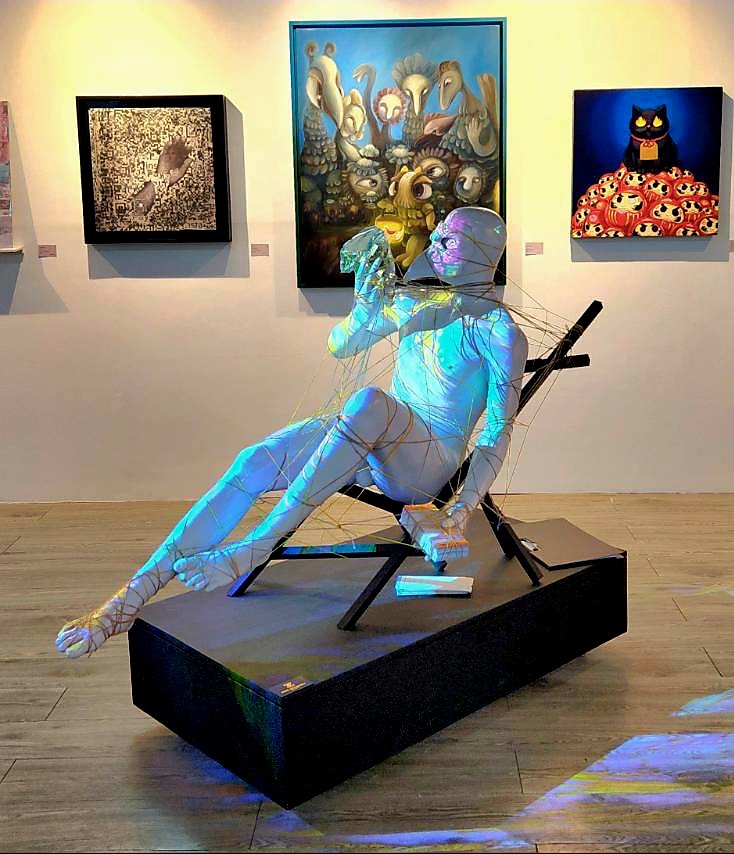
photography by Doro Barandino
“Art is unpredictable and goes in different directions. I have no idea. I would rather live the present moment.” —Bencab, National artist of the Philippines.
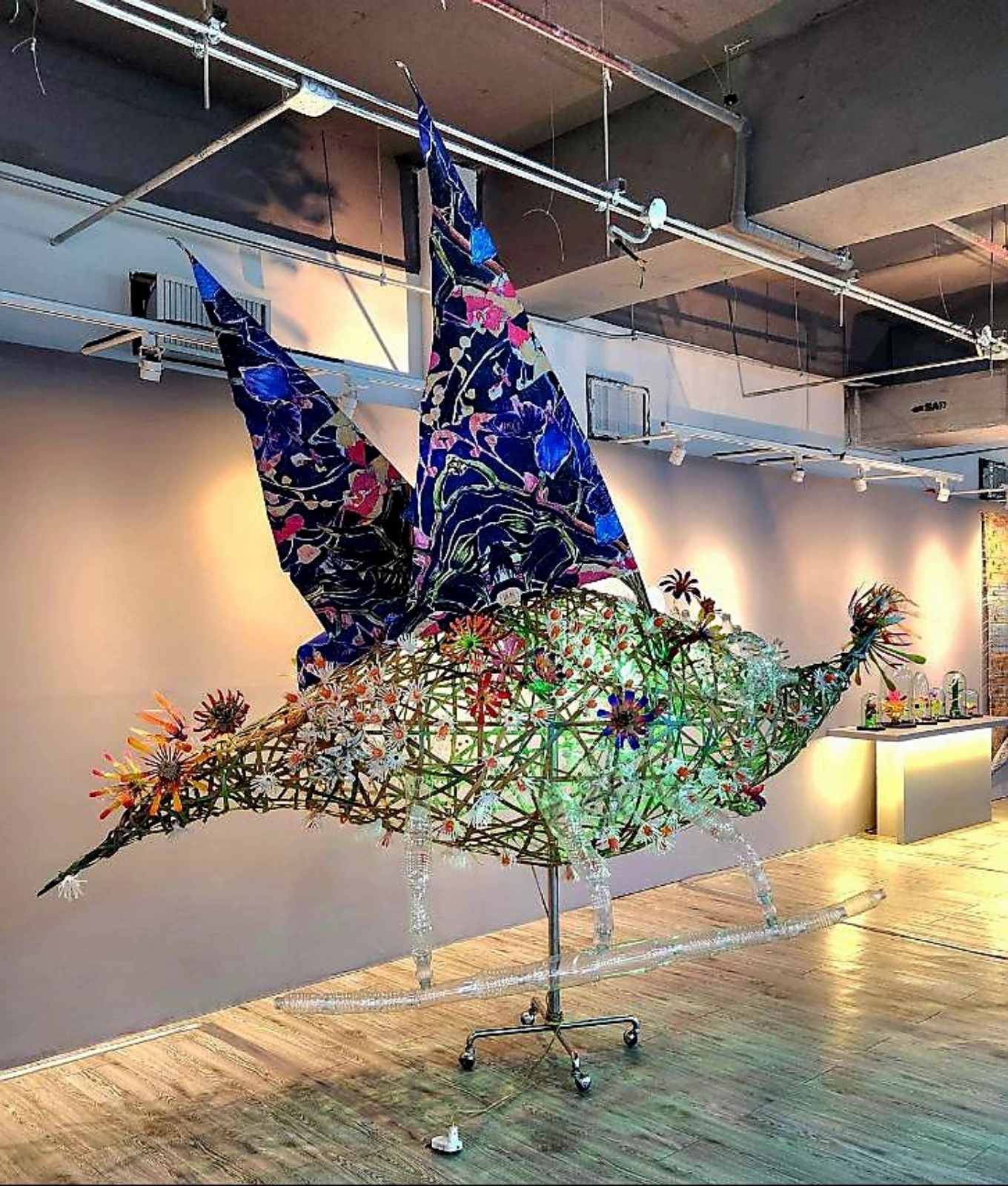
Vinta by Protegeri, collaboration art piece by Leeroy New, Solenn Heuseff and Vito Selma
Q&A with interior decorator and jewellery designer Doro Barandino
Which of the participating art galleries had the most unified and exciting theme?
Leon Gallery had the most amazingly put-together collection. Though the gallery engaged various artists, the overall visual effect felt like one unified theme. Leon Gallery used a sack-like cloth (most likely raw linen) as the background for the booth, and it brought the collection together. It had an old-world feel in a chaotic setting.
Who were the artists that were the most visually engaging?
The works of Carlo Tanseco were definitely my favorite. The artist used an eye chart (Snellen chart) as the background for the image of Dr. Jose Rizal giving us the middle finger—such an “in your face” message. The concept of our national hero as a modern-day provocateur was a wake-up call to everyone. Very subversive and underground material. I was also attracted to the works of Japanese artist Tadashi Kogure; they’re very architectural.
Was the choice of venue and its layout helpful in engaging the whole art vibe?
What I noticed was that the masters like Juan Luna, Fernando Amorsolo, and Fernando Zóbel still attracted the most viewers at the art fair. People are naturally drawn to their masterful strokes and historical significance, or perhaps these artworks are not readily accessible for public viewing. Or maybe those booths that carried the masters’ works were strategically positioned right after the registrar.
The choice of venue at Center One was a good move—it created a total art vibe. Manila Art Fair remains the premier art fair in the country today, showcasing the finest modern and contemporary art while offering curated projects and immersive installations.
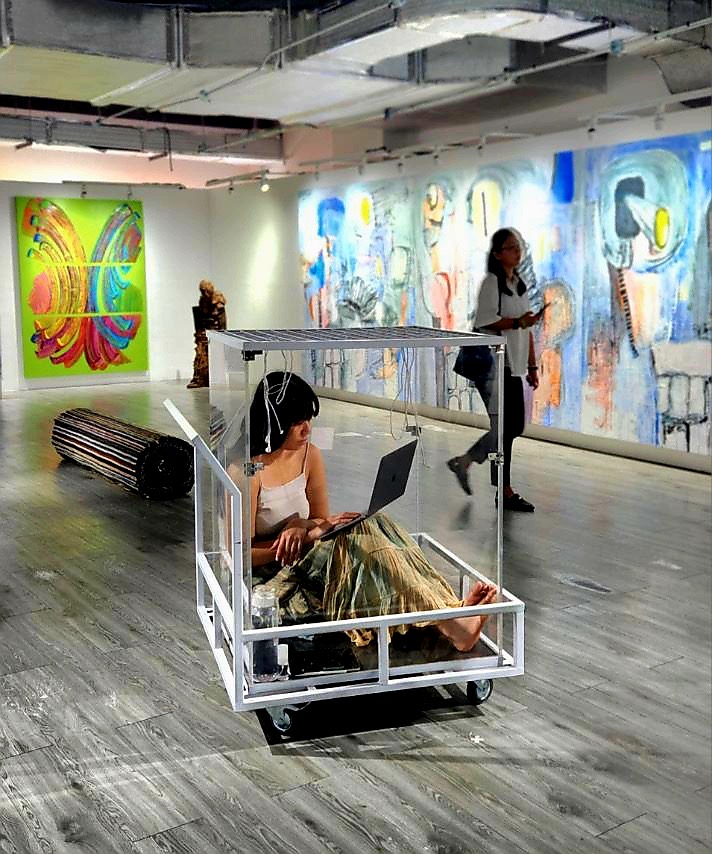
The Standard by Thai artist Pitchapa at the Triangular durational, performance art.
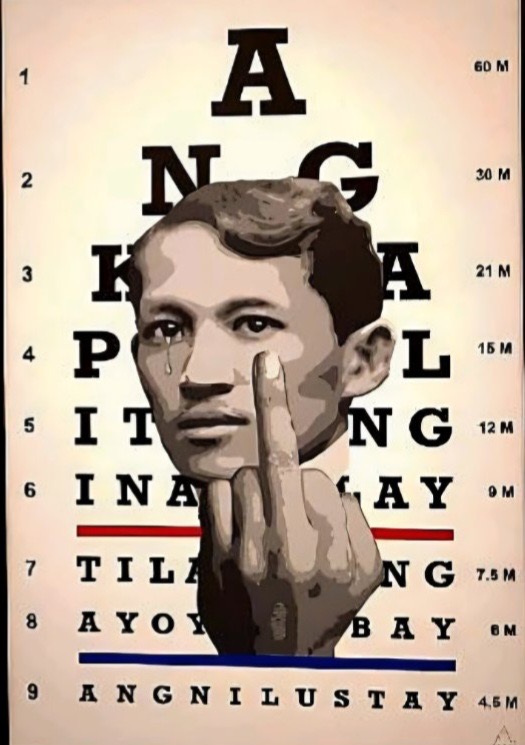
Bato Bato sa Langit by Filipino artist Carlo Tanseco
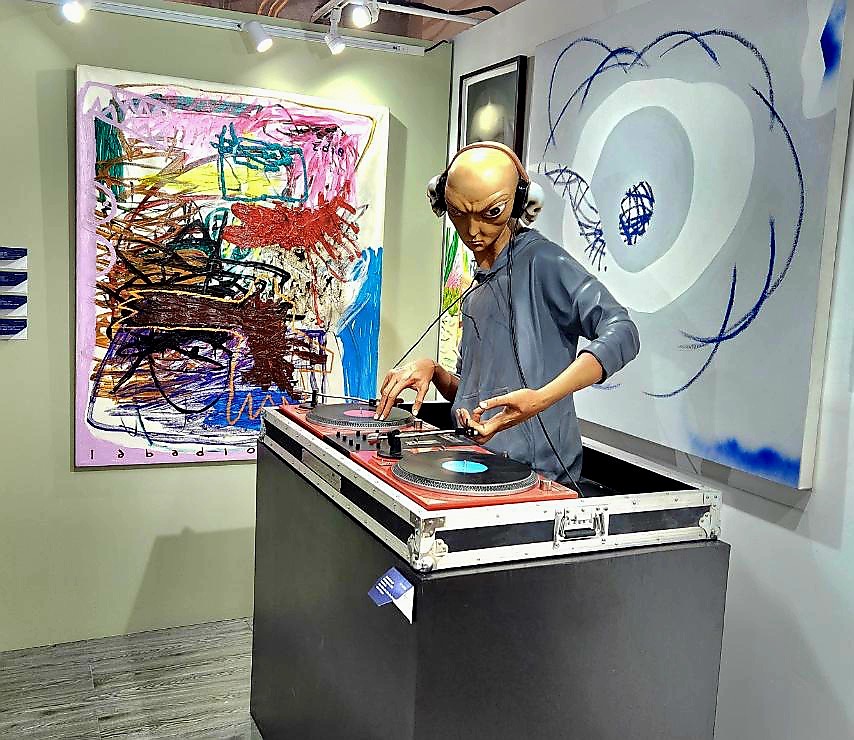
Stocking Proportions Menumpuk Proporsi by Indonesian artist Labadiou Piko
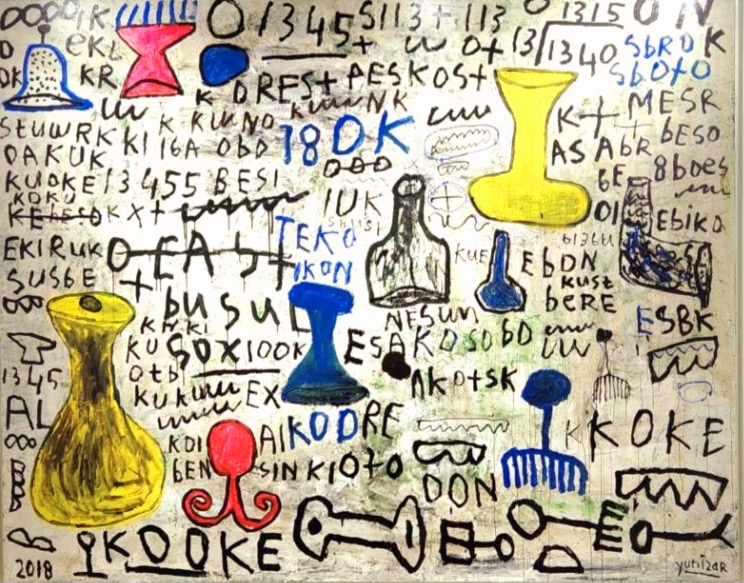
Untitled by Indonesian artist Yunizar
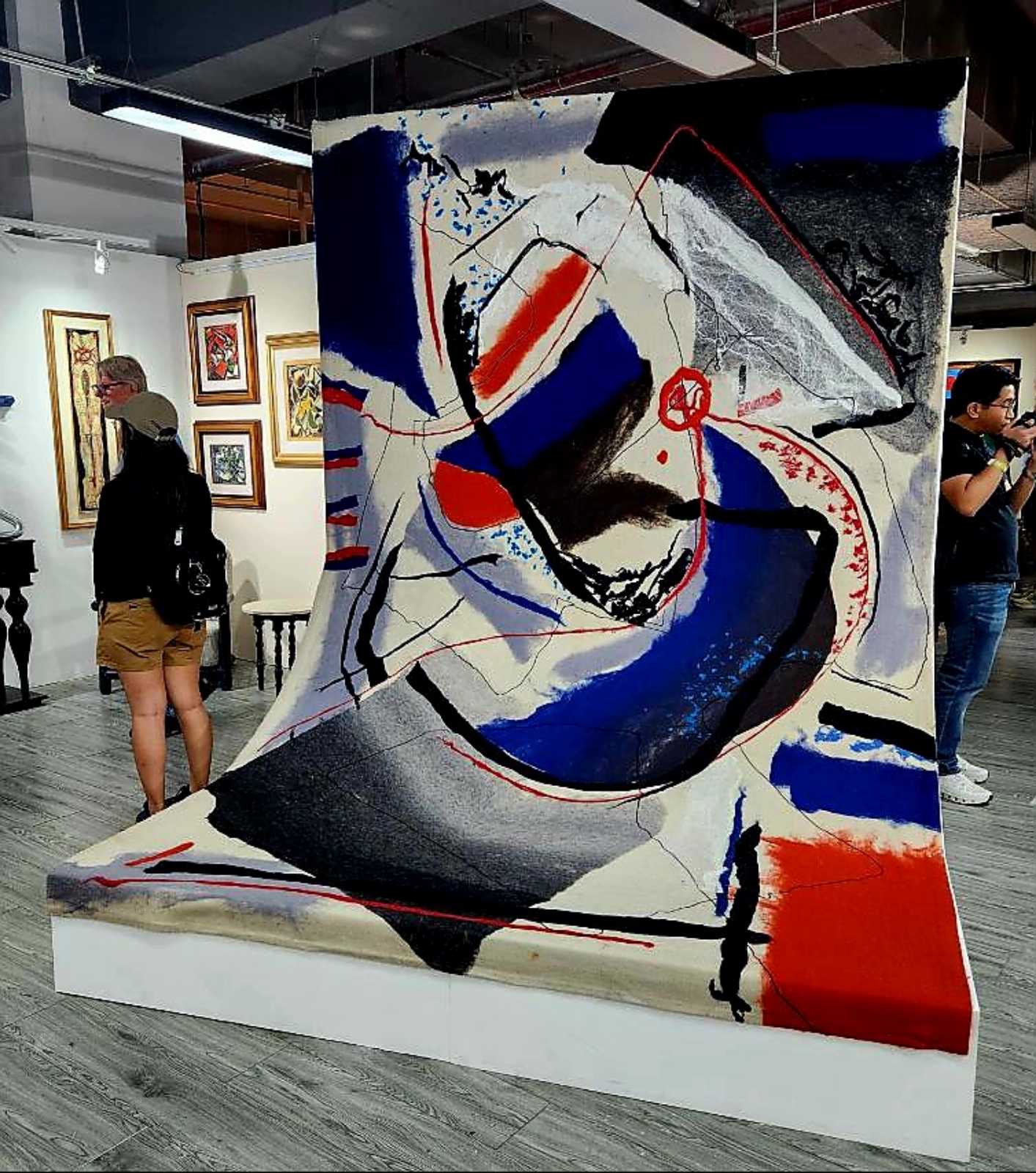
Filipiny, wool tapestry by national artist of the Philippines,Federico Aguilar Alcuaz.

Untitled by German artist Valentin Elias Renner

Interior decorator and jewellery designer Doro Barandino is also a regular contributor for zee.ph
Arts & Culture
Visayas Art Fair Year 5: Infinite Perspectives, Unbound Creativity
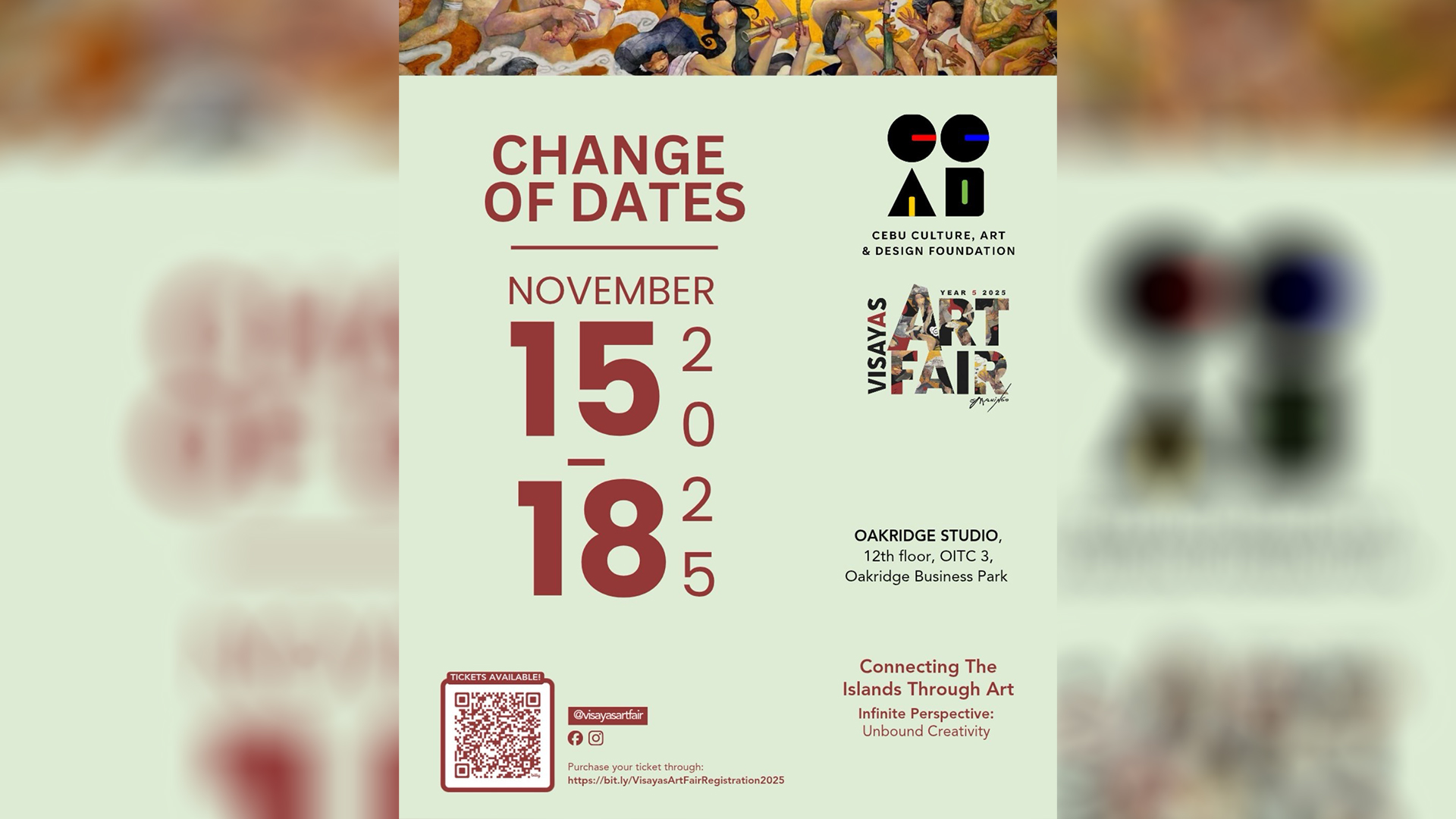
by Jing Ramos
This year’s Visayas Art Fair marks its 5th anniversary, celebrating the theme “Infinite Perspectives: Unbound Creativity.” The fair continues its mission of bridging creativity, culture, and community in the country. This milestone edition strengthens its partnership with the National Commission for Culture and the Arts and expands collaborations with regional art organizations and collectives—reinforcing its role as a unifying platform for Philippine art.
VAF5 features the works of Gil Francis Maningo, honoring the mastery of his gold leaf technique on opulent portraits of the Visayan muse Carmela, reflecting spiritual awareness.

Gil Francis Maningo is celebrated for his gold leaf technique.
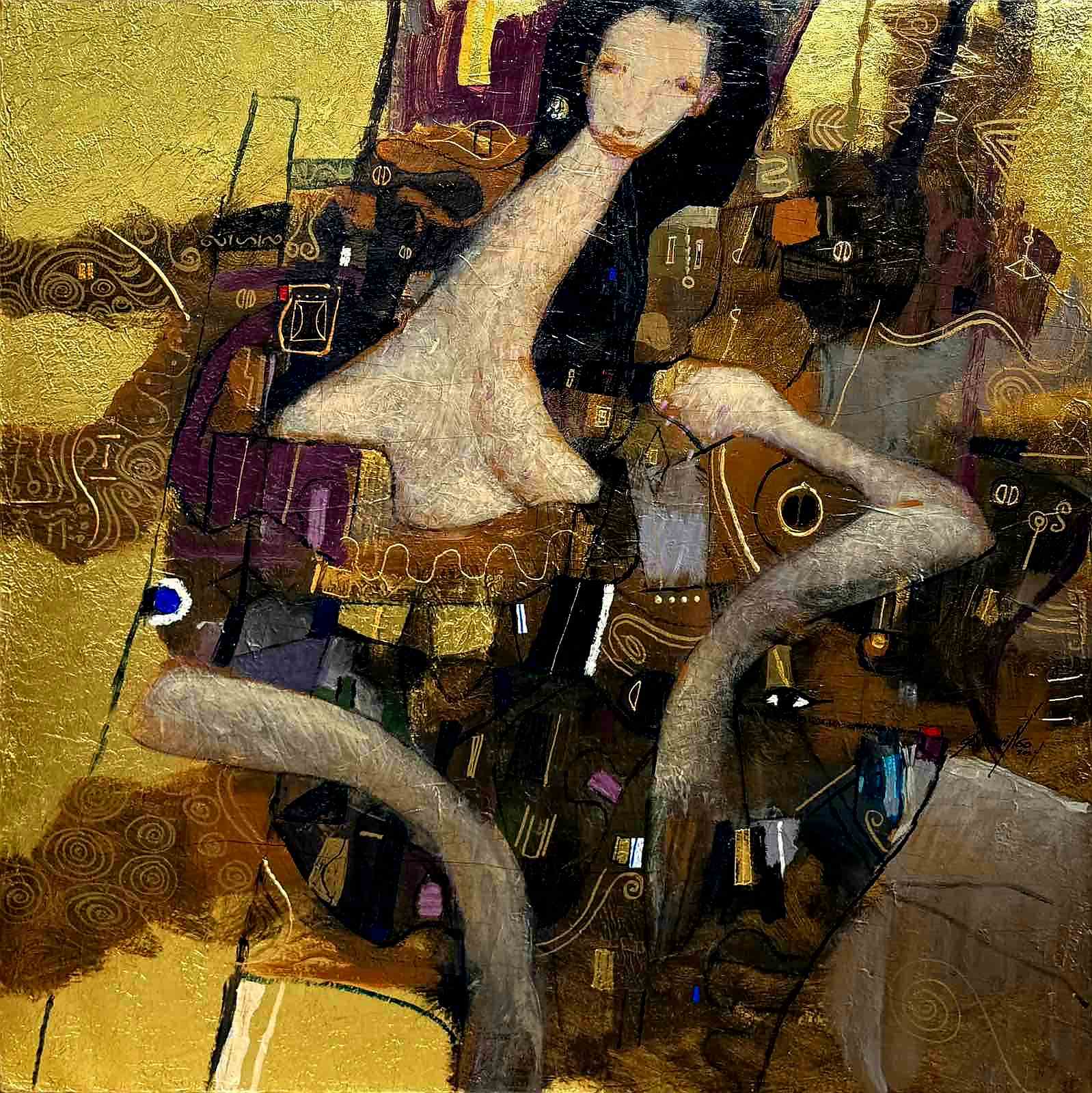
Gil Francis Maningo’s recurring theme of his Visayan muse “Carmela”.
Another featured artist is Danny Rayos del Sol, whose religious iconography of Marian-inspired portraits offers a profound meditation on the sacred and the sublime. This collaboration between two visual artists sparks a dialogue on the Visayan spirit of creativity and resilience. Titled “Pasinaya,” this dual showcase explores gold leaf as a medium of light and transcendence.
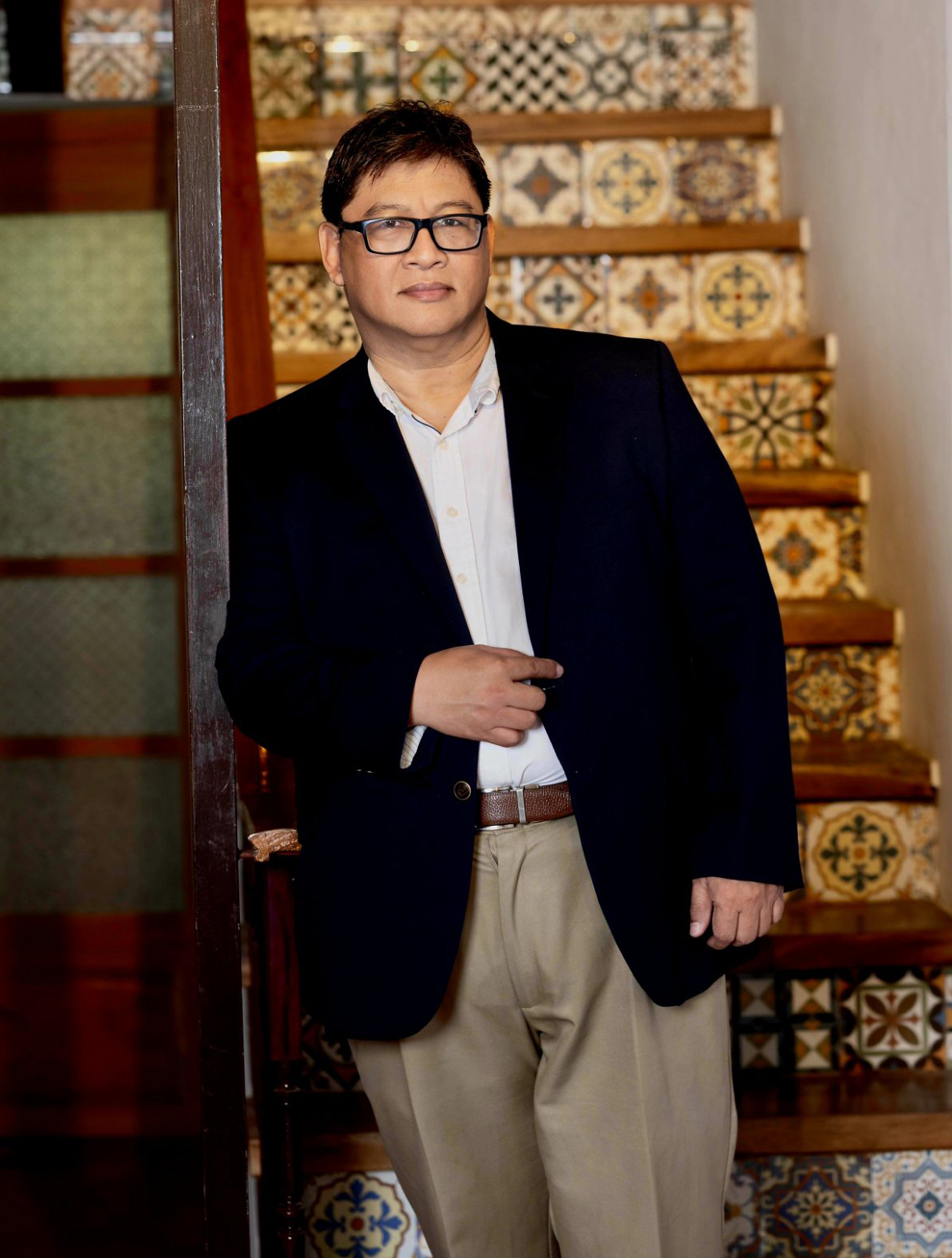
Artist Danny Reyes del Sol
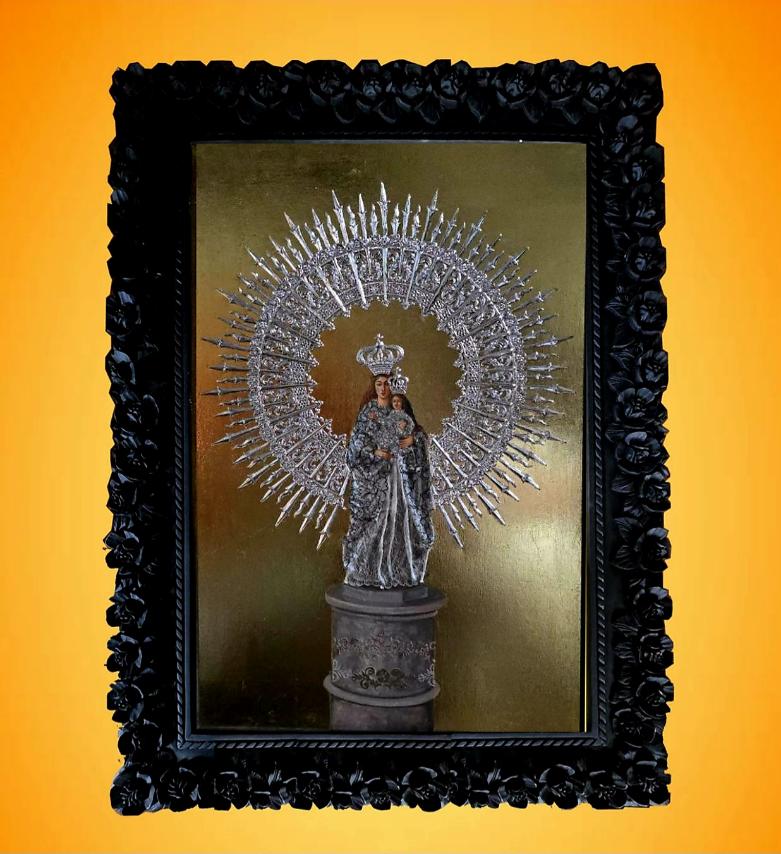
Danny Reyes del Sol’s religious iconography.
Now in its fifth year, the Visayas Art Fair has influenced a community of artists, gallerists, brokers, collectors, museum curators, and art critics—constructing a narrative that shapes how we approach and understand the artist and his work. This combination of factors, destined for popular consumption, illustrates the ways in which art and current culture have found common ground in a milieu enriched by the promise of increased revenue and the growing value of artworks.
Laurie Boquiren, Chairman of the Visayas Art Fair, elaborates on the theme, expressing a vision that celebrates the boundless imagination of unique artistic voices:
“Infinite Perspectives speaks of the countless ways artists see, interpret, and transform the world around them—reminding us that creativity knows no single point of view. Unbound Creativity embodies freedom from convention and controlled expression, allowing every artist to explore and experiment without borders.”
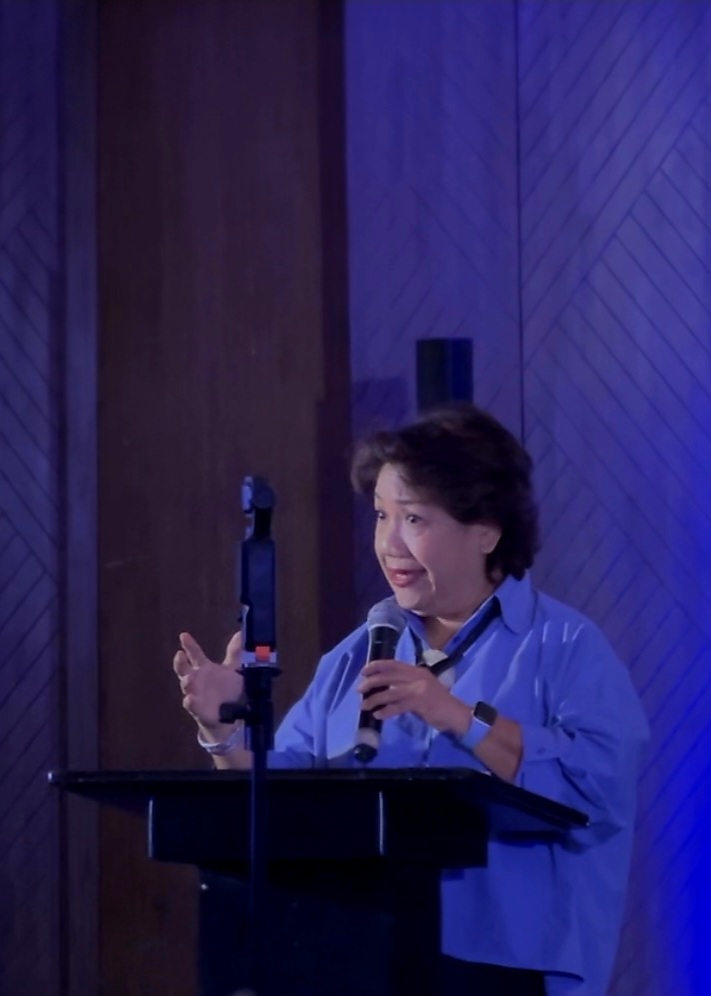
Laurie Boquiren, Chairman of the Visayas Art Fair has tirelessly championed the creative arts for the past five years.
Arts & Culture
Kultura. Kapital. Kasalukuyan: Art that Speaks of Today
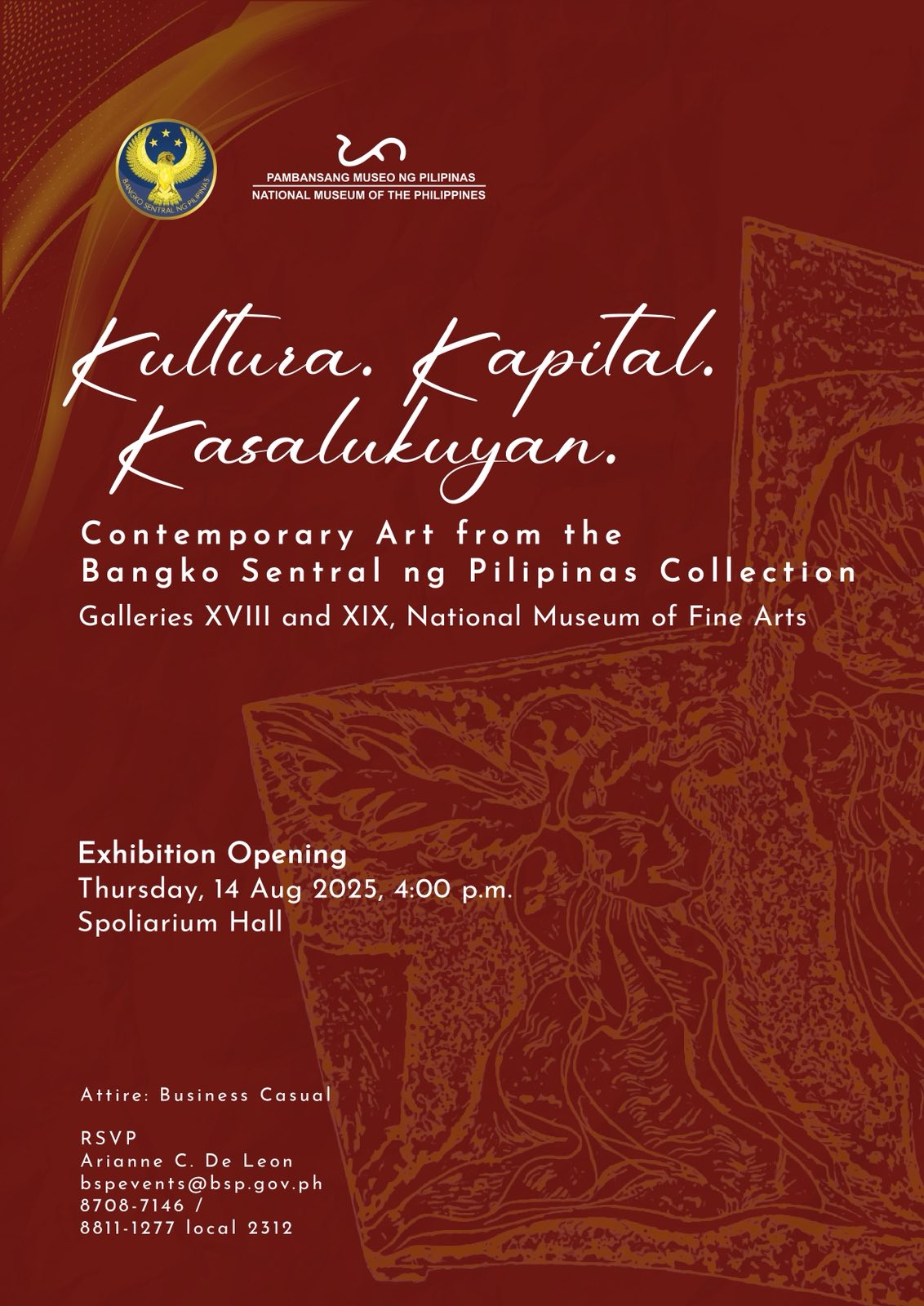
by Jose Carlos G. Campos, Board of Trustees National Museum of the Philippines
The National Museum of the Philippines (NMP) and the Bangko Sentral ng Pilipinas (BSP) recently teamed up to prove that money isn’t just for counting—it’s also for curating! Their latest joint exhibition, Kultura. Kapital. Kasalukuyan: Contemporary Art from the Bangko Sentral ng Pilipinas Collection, is now open, and it’s a real treat for art lovers and culture buffs alike.
On display are gems from the BSP’s contemporary art collection, including masterpieces by National Artist Benedicto Cabrera (Bencab), along with works by Onib Olmedo, Brenda Fajardo, Antipas Delotavo, Edgar Talusan Fernandez, and many more. Some of the artists even showed up in person—Charlie Co, Junyee, Imelda Cajipe-Endaya, Demi Padua, Joey Cobcobo, Leonard Aguinaldo, Gerardo Tan, Melvin Culaba—while others sent their family representatives, like Mayumi Habulan and Jeudi Garibay. Talk about art running in the family!
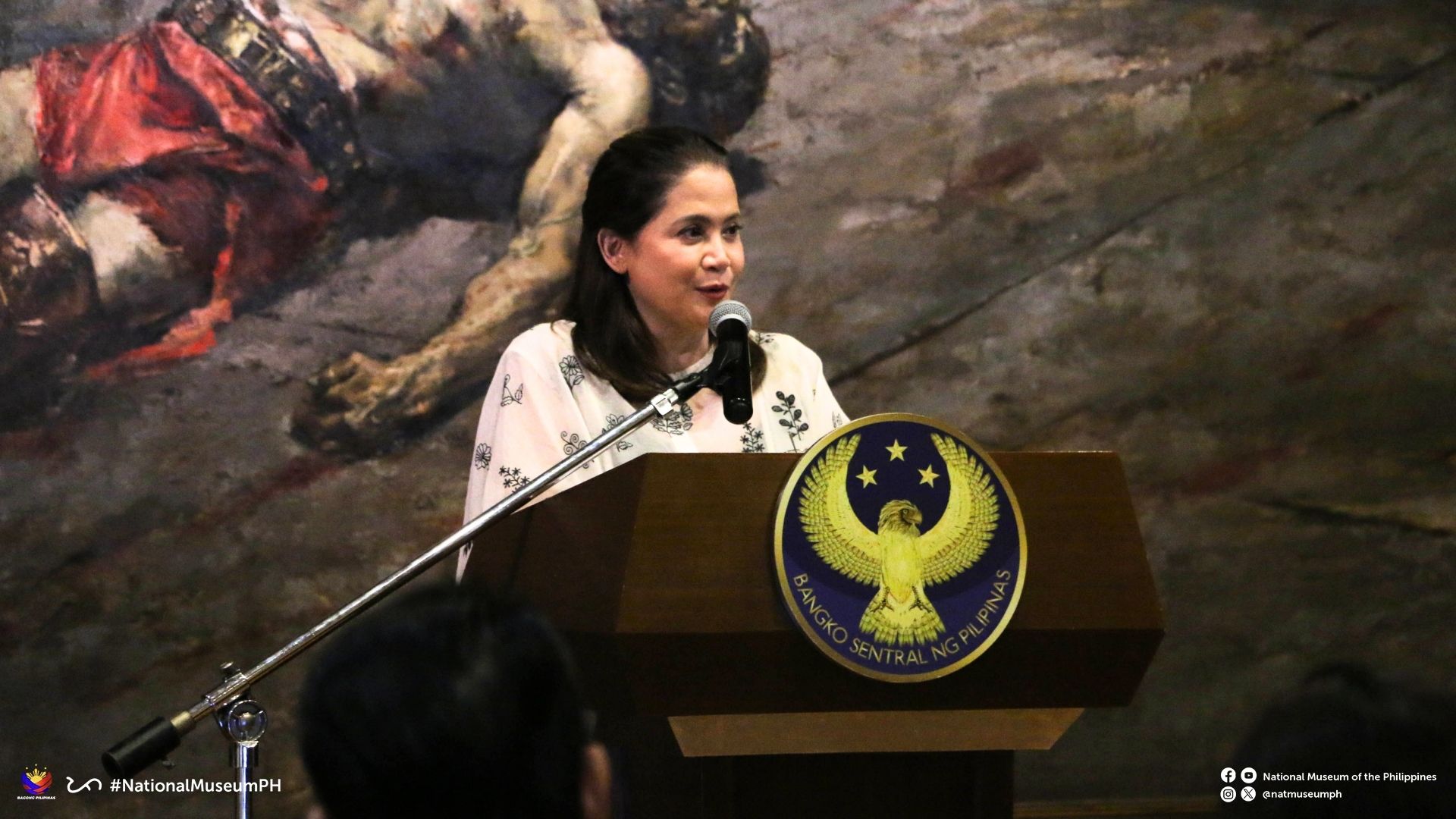
Deputy Governor General of the BSP, Berna Romulo Puyat
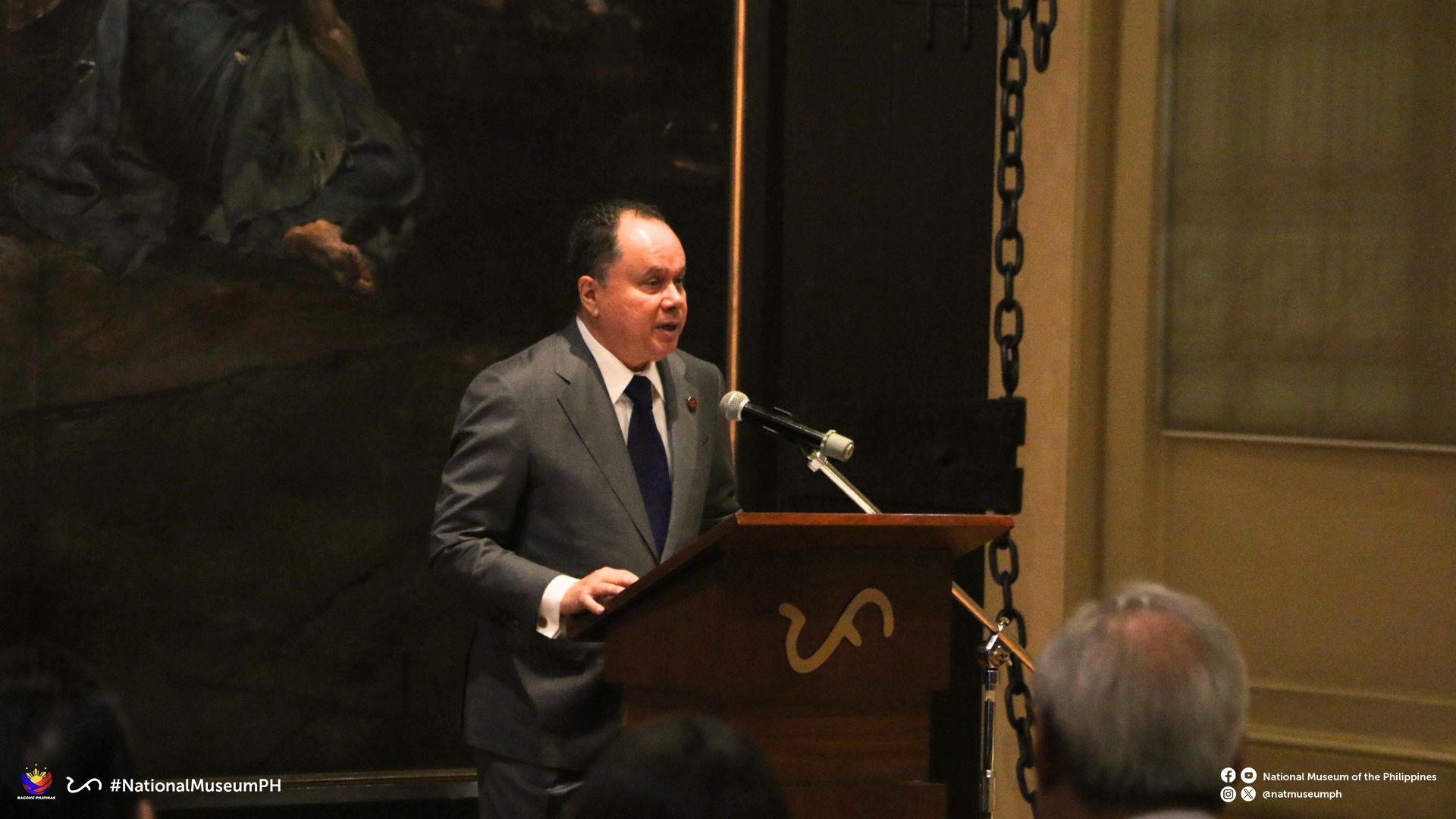
Chairman of NMP, Andoni Aboitiz
The BSP Governor Eli M. Remolona, Jr. and members of the Monetary Board joined the event, alongside former BSP Governor Amando M. Tetangco, Jr., Ms. Tess Espenilla (wife of the late Nestor A. Espenilla, Jr.), and the ever-graceful former Central Bank Governor Jaime C. Laya, who gave a short but enlightening talk about the BSP art collection.
From the NMP, Chairman Andoni Aboitiz, Director-General Jeremy Barns, and fellow trustees NCCA Chairman Victorino Mapa Manalo, Carlo Ebeo, and Jose Carlos Garcia-Campos also graced the occasion. Chairman Aboitiz expressed gratitude to the BSP for renewing its partnership, calling the exhibition a shining example of how financial institutions can also enrich our cultural wealth.
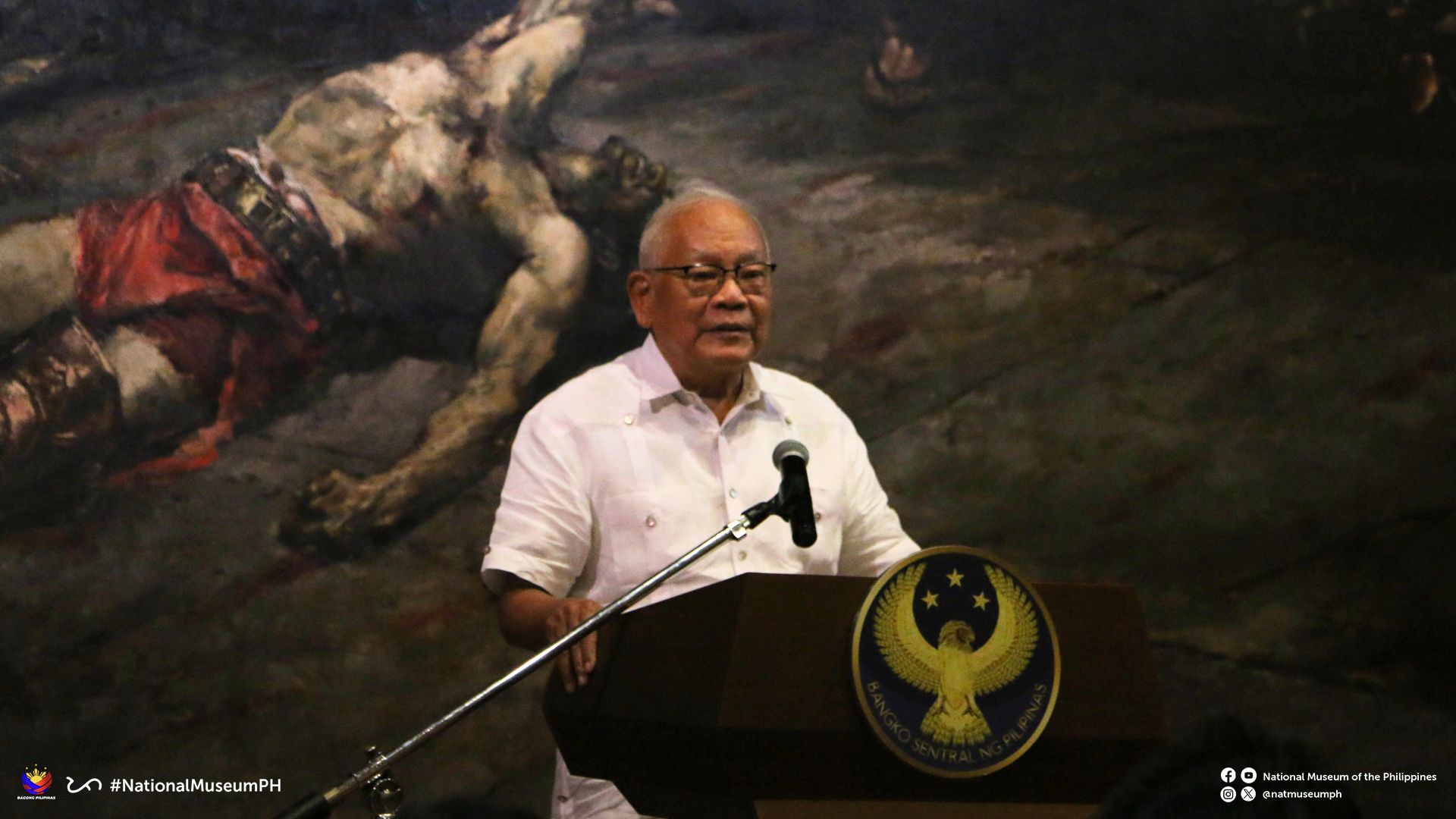
Former Governor of BSP Jaime Laya
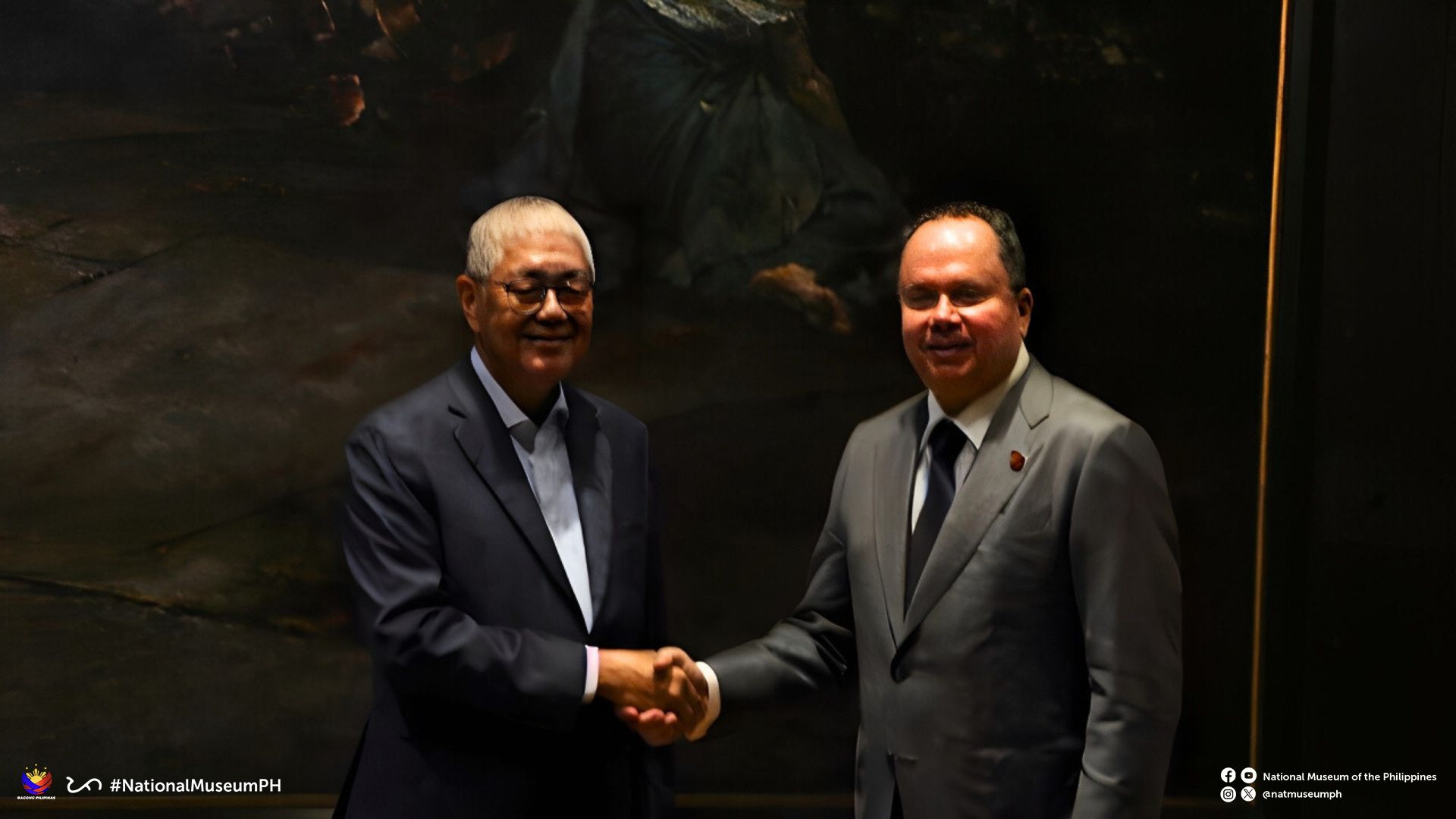
Governor of BSP Eli M. Remona and Chairman of NMP Board Andoni Aboitiz
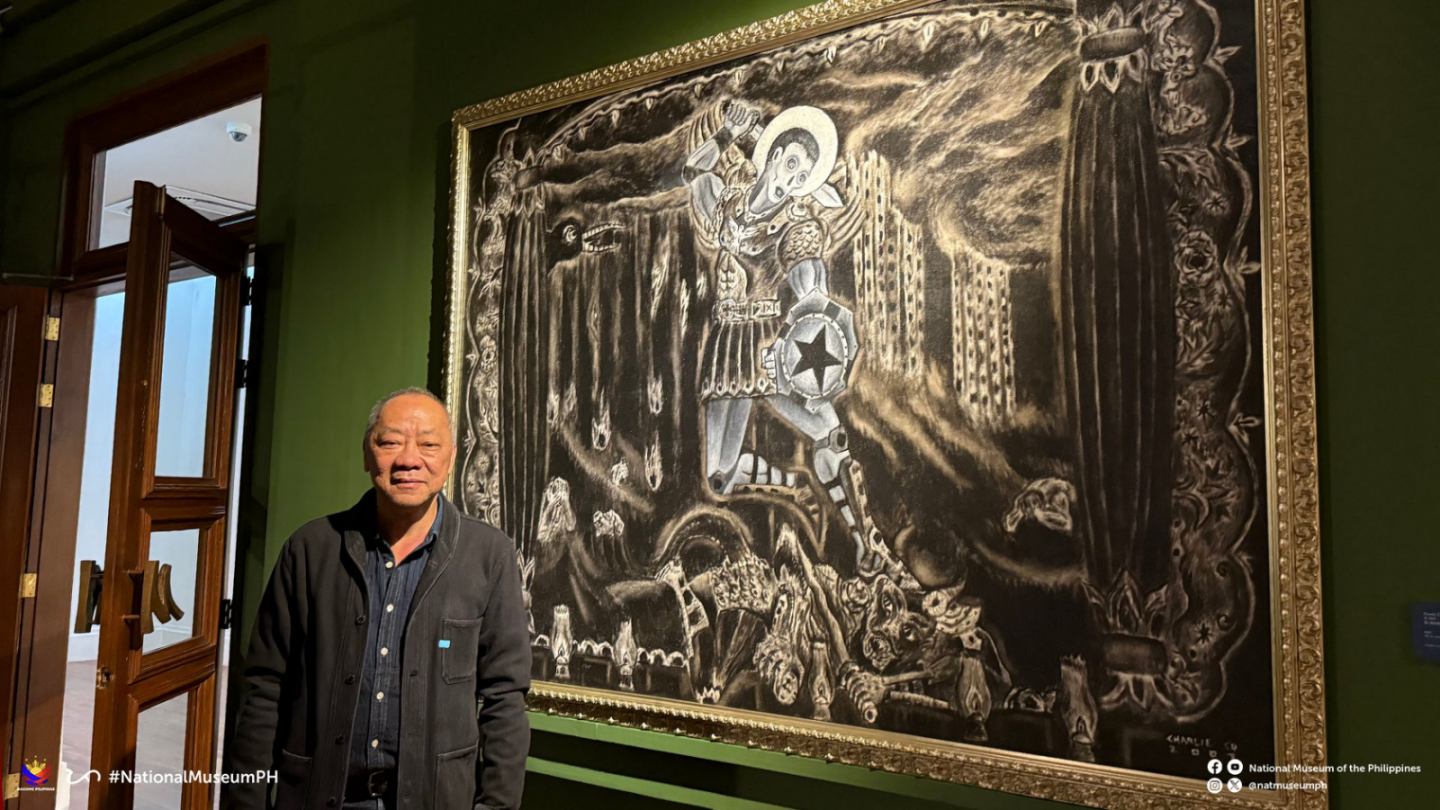
Artist Charlie Co
Before the official launch, a special media preview was held on 5 August, hosted by BSP Deputy Governor Bernadette Romulo-Puyat and DG Jeremy Barns. It gave lucky guests a sneak peek at the collection—because sometimes, even art likes to play “hard to get.”
The exhibition Kultura. Kapital. Kasalukuyan will run until November 2027 at Galleries XVIII and XIX, 3/F, National Museum of Fine Arts. Doors are open daily, 9:00 AM to 6:00 PM. So if you’re looking for something enriching that won’t hurt your wallet (admission is free!), this is your sign to visit. After all, the best kind of interest is cultural interest.
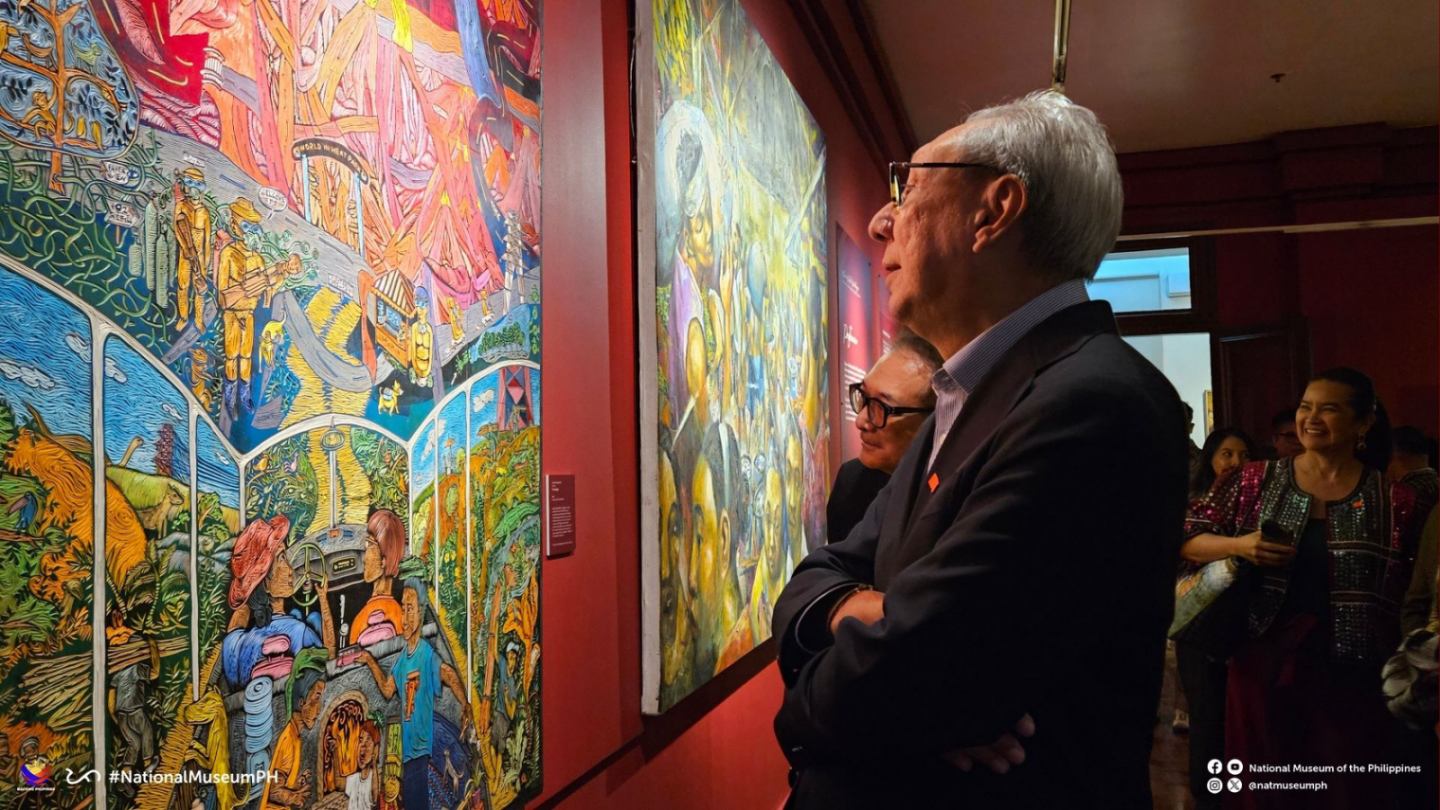
Monetary Board of the BSP, Walter C. Wassmer
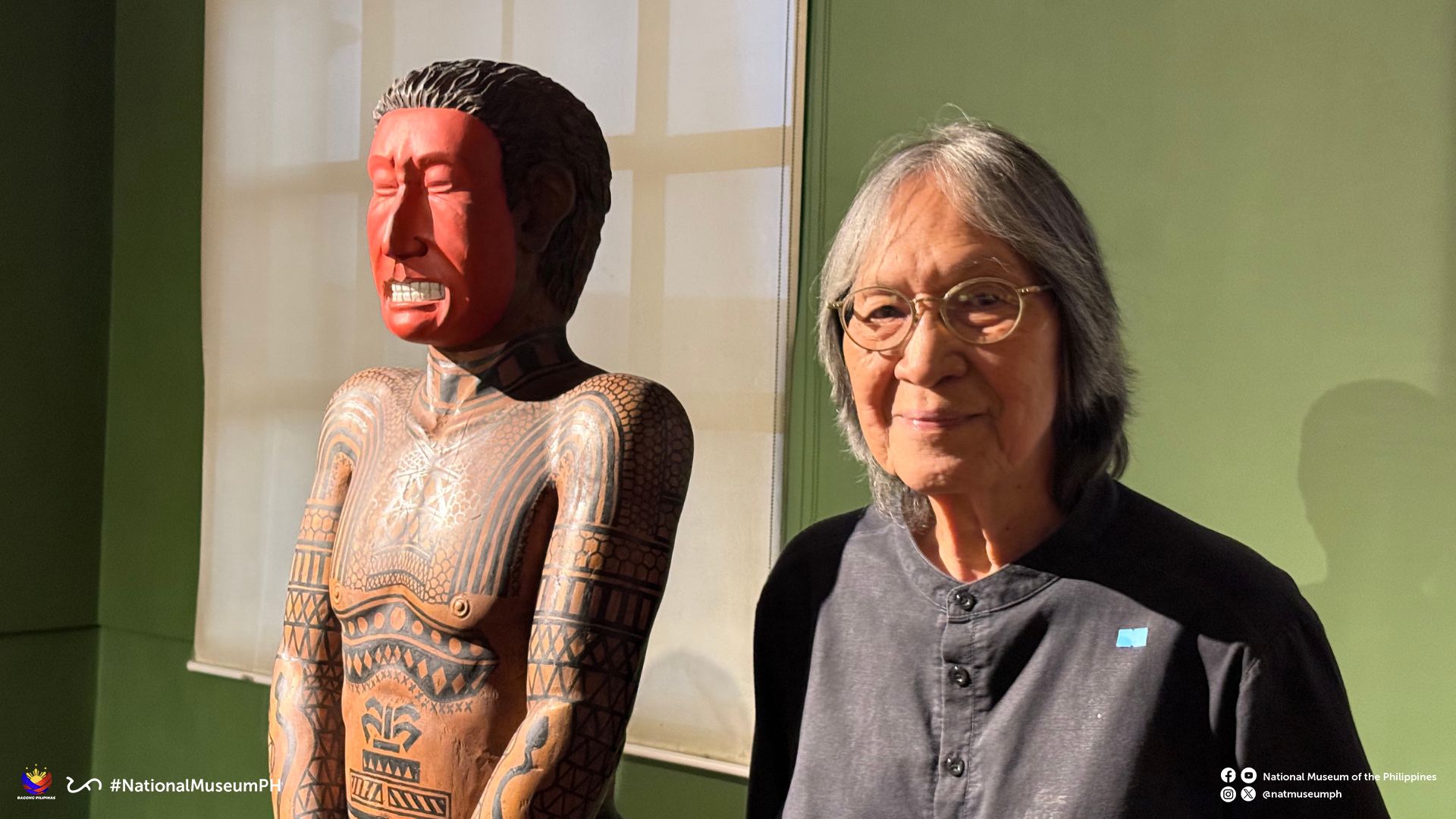
Luis Yee, Jr. aka ‘Junyee’ The Artist beside his Sculpture
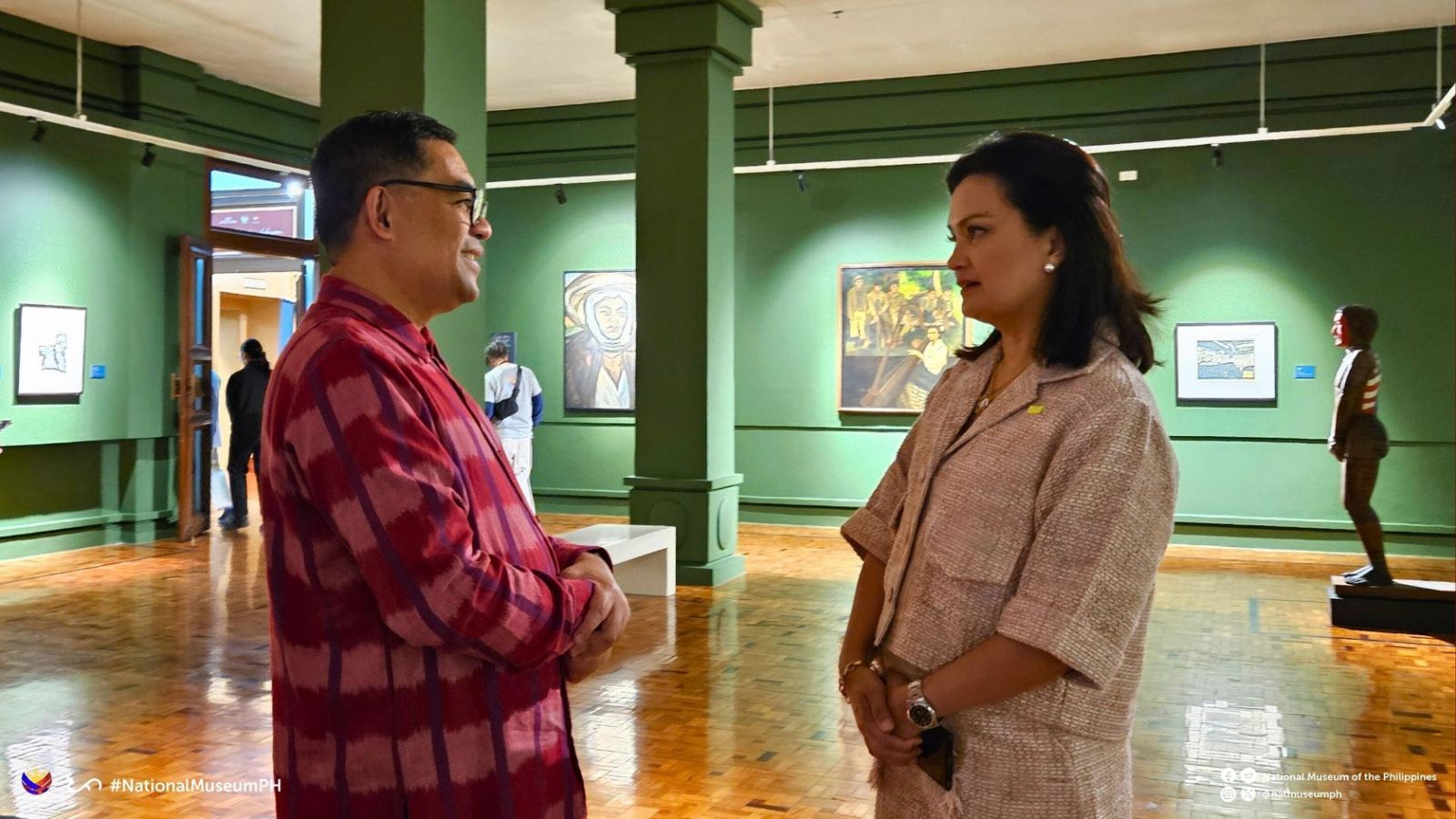
Arvin Manuel Villalon, Acting Deputy Director General for Museums, NMP with Ms. Daphne Osena Paez
-

 Prime Target2 months ago
Prime Target2 months agoBee Urgello–Fashion Influencer and Designer’s Muse Goes on a Hiatus
-

 Fashion2 months ago
Fashion2 months agoCloud Dancer: The Resonant Reset of 2026
-

 Travel2 months ago
Travel2 months agoSunlight in Siquijor: Discovering the Landscape Shifts and Coastal Plains of this Mystical Island
-

 QuickFx3 months ago
QuickFx3 months agoIn Black and White: Photographer Richard Avedon Captures the Cultural Zeitgeist of His Era
-
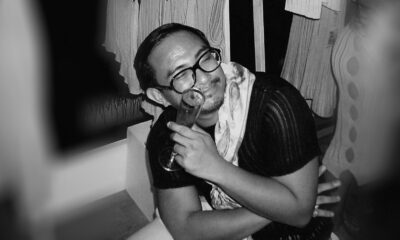
 Prime Target2 months ago
Prime Target2 months agoRod Malanao: Empowering the Growth of the Luxury Fashion Industry to Designing Knit Wear on the Side
-

 QuickFx2 weeks ago
QuickFx2 weeks agoChromatic Narratives: Wayne Lacson Forte at the Negros Museum
-

 QuickFx1 month ago
QuickFx1 month agoBright Young Things: Why Cecil Beaton Remains Vital in the World of Photography
-
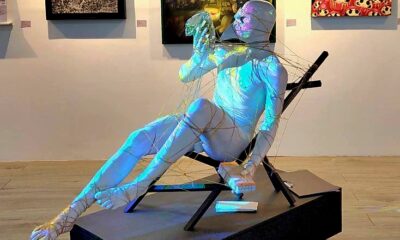
 Arts & Culture2 weeks ago
Arts & Culture2 weeks agoArt Beat: Scenes From the Manila Art Fair 2026


